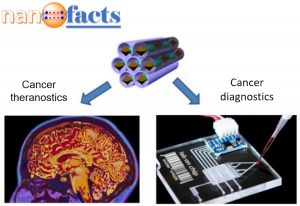NANOFACTS – Networking Activities for Nanotechnology-Facilitated Cancer Theranostics
Acronym: NANOFACTS
Implementation period: 01/01/2021 - 31/12/2023
GA number: 952259
Type of Project: Horizon 2020

Project aim: The main goal of NANOFACTS is to enhance research capabilities at BioSense institute regarding research in cancer theranostics nanomaterials and biosensing diagnostics of cancer, and to promote collaboration with internationally leading institutions at EU level.
About the project: In order to widen the research agenda at BIOS with cancer-related research and health-related biosensing technologies, NANOFACTS will harness and improve pre-existing links with two leading European research institutions in the field of nanotechnology and development of biosensors:
•Trinity College Dublin (TCD), Ireland, The School of Pharmacy and Pharmaceutical Sciences, an expert in application of nanotechnology for cancer treatment and imaging; and its validation, including biocompatibility of nanoparticles/nanodevices.
• Vienna University of Technology (TUW), Faculty of Technical Chemistry, Institute of Applied Synthetic Chemistry and Institute of Chemical Technologies and Analytics, an expert in devising health-related biosensors.
The main strategies to be explored during the project activities will include:
a) BIOS researchers gaining knowledge on devising theranostic nanoparticles for real-time in vivo detection of cancer biomarkers, along with simultaneous targeted cancer therapy and imaging and
b) enhancing the capacity of biosensing technologies at BIOS with cancer-related biosensing, including construction of an array of user-friendly personalized point of-care microfluidic and electronic diagnostic devices for electronic and optical sensing of cancer biomarkers, which could be introduced to home disease-monitoring.


This project has received funding from the European Union’s Horizon 2020 research and innovation program under grant agreement No. 952259.
Themes:
1) Silica nanomaterials
2) Medical and healthcare applications
3) Biosensors
4) Microfluidics
5) Biomolecular engineering